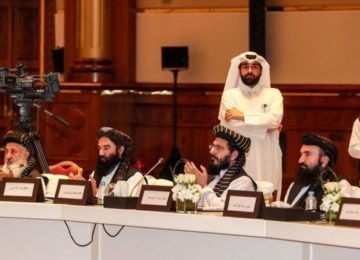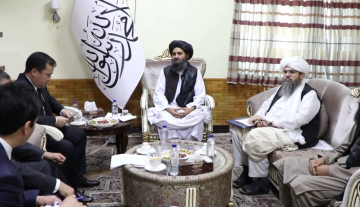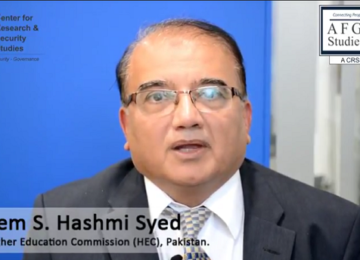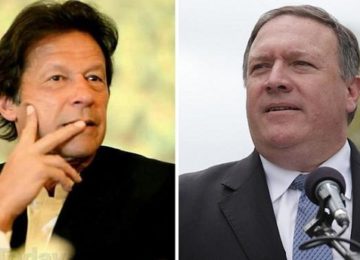India consciously or unconsciously seems to be good at applying the Mandala theory, given by an ancient Indian strategist, Chanakya Kautilya, on its neighborhood vis-e-vis Pakistan, Afghanistan, and Iran. A hegemonic theory to expand a country’s influence beyond its defined borders, the Mandala theory stipulates that a country’s immediate neighbor is its enemy while the country next to it is its friend. Hence, as per this principle, Pakistan is an adversary of India whereas, Afghanistan is a friendly country for New Delhi.
Afghanistan, seen from Kautilya’s theoretical angle, should be an enemy of Pakistan’s. However, it shares not only the longest border with it, but has very strong ethnic linkages between the Pashtuns of both countries, in addition to cultural, religious and geographic commonalities of both nations. These commonalities make their interests more common, as evident from the presence of Afghan refugees in Pakistan.
Indian interests in Afghanistan are short-term and more artificial unlike Pak-Afghan’s natural, long-term and collective interests.
When applying the Mandala theory to India, while the country, being a sovereign state, is free to nurture relations with any country, the case of Afghanistan vis-e-vis India becomes more special. Pakistan thinks of the Indian soft power mask in Afghanistan as a disguise for its hegemonic interests aimed at undermining Pakistan’s national security. New Delhi’s influence in Kabul is increasing gradually due to several factors where Trump’s new South Asian strategy has also become more prominent. Legitimately, Pakistan cannot question the new outlooks of the trio of the United States, India and Afghanistan, where Washington has also claimed that Islamabad’s concerns regarding the inclusion of the Indian factor in Afghanistan should not be perceived as a threat to its national interests; even though the case is implicitly, if not, formally declared.
Afghanistan as a strategic depth for Pakistan has been a controversial idea for quite long and seems not only obsolete but impractical today. What Pakistan seeks is a friendly government in Kabul to prevent the influence of India on its soil against Pakistan; in other words, a political and strategic absence of India’s threat in its western neighboring country.
Border Management, starting from fencing the border from Pakistani side with Afghanistan is a death certificate for such strategic depth.
Though it is well-known belief that Indian intelligence agency, Research and Analysis Wing (RAW), is working in Afghanistan to destabilize Pakistan through its insurgents in Balochistan and the Federally Administered Tribal Areas (FATA), to which Pakistan and Kabul cannot simply turn a blind eye. It also seems that Afghanistan exploits this as a political tool to coerce Pakistan in many ways. Recent confessions of Kulbushan Yadav and Ehsanullah Ehsan are an unambiguous depiction of the Indian proxy covert warfare against Pakistan.
Indeed, India and Afghanistan are both independent countries and are free to enjoy a strategic partnership, but if for Afghanistan, it is an opportunity to cash its tilt towards India and for India, it is a deliberate nutcrack encirclement of Pakistan from both its western and eastern borders, then it raises concerns for Pakistan.
After the Taliban government was overthrown by US-led NATO forces and replaced with a new democratic government, led formerly by President Hamid Karzai and now by the National Unity Government of Ashraf Ghani and Abdullah Abdullah, Pakistan has been blatantly accused by Afghan government of providing sanctuaries to the Afghan Taliban and the Haqqani network. Despite its efforts as a front line ally in the US-led war on terror in Afghanistan, Pakistan is subjected to allegations by Afghan governments as a prime reason for the instability in the country. This seems to be an extreme generalization and exaggeration by Kabul which seems to have continually structured negative perceptions of Islamabad. Somehow intentionally propagated by those who accuse only Pakistan of sponsoring terrorism in the region and delude some critical questions under this shadow.
Pakistan’s role in the cold war is not the ‘only cause’ of Afghanistan’s present situation. However, it undoubtedly is one of the shortcomings to be manipulated.
India uses its soft power, through its diaspora abroad and attracts businessmen for its market, one of the largest in the world, while also strategically balancing its relations with other great powers. A depiction of India’s pursuance of its strategic goals abroad is the Sino-Indian trade which stood at $70.73 billion in 2015-16 despite their regional hegemonic competition and border dispute.
India is one of the trading partners of Afghanistan as well which uses Afghanistan-Pakistan Transit Trade Agreement (APTTA), redesigned in 2010, for imports from the latter and exports to it. The agreement has yet to be renewed after its duration expired in 2015 and Kabul’s recent delaying of the process. The recent development of utilizing Chabahar port of Iran through the Indian Ocean by Afghanistan and India has been supposed as enhancing tri-lateral trade, however, it is a costly and least-lasting means of air-corridor between the two countries. It is worth mentioning here that Pakistan is the second largest importing partner of Afghanistan as well as the top most exporting destination for it, where India barely falls in the list of Afghanistan’s top ten trading partners. Though, it is the second top exporting country for Afghanistan.
However, since the last couple of years, Pakistan’s trade with Afghanistan is declining due to poor border management and militancy across the Durand Line, whereas, on the other hand, an upsurge in trade has been observed with India in the backdrop of the duo’s growing diplomatic ties.
Afghan President Ashraf Ghani asserted in his recent visit to New Delhi, that unless India is not given the permission of exporting to Afghanistan and Central Asia through Pakistan as a transit state, it would not join the golden opportunity of China Pakistan Economic Corridor (CPEC). This simply shows the diplomatic inferiority of Afghanistan’s own choice.
Not joining CPEC and calling for allowing India to trade through Pakistan instead is not in the best interests of Afghanistan either, except a tool of diplomatic coercion on the part of Afghan government.
Afghanistan is a landlocked country with no direct access to India and, thus, its trade with the latter does not look as viable and lacks long-term vision, unless Pakistan gives it the green signal that it has given for Kabul’s exports to New Delhi. At the moment, Pakistan has not allowed the same to Indian exports because of their bilateral tense relations and Pakistan’s security concerns with the former.
The Afghan government, while making use of its relations with India, is coercing Pakistan, it should realize that its real leverage of trade is not efficient and sustainable without Islamabad’s cooperation. In the same vein, the United States, which has been seeking an increased role of India in Afghanistan, as well as in its objectives to counter China, should realise India cannot substitute Pakistan.
What both Pakistan and Afghanistan should reassess is their border management and address the issues that stand in their Transit Trade Agreement.
Extending China-Pakistan Economic Corridor (CPEC) to Afghanistan is vital for Pakistan and it includes more long term economic development rather than the short term alternatives of constraining each other at the moment. For extending their bilateral economic activities in the region, it is also necessary to strengthen SAARC as a regional organization to boost ties between the member countries rather than undermining its role time and again either by India, or Pakistan, or any other member state.
Afghanistan should have good relations with all countries but that should not be at the expense of Pakistan which is its natural friend due to their many commonalities.
A military, political or strategic partnership between India and Afghanistan may be more worrying for Pakistan than their economic activities. This was pointed out by Prime Minister Shahid Khaqan Abbasi in a recent interview to the Council on Foreign Relations. While training the Afghan military was refused by Kabul when Pakistan made the offer, it was wholeheartedly welcomed when it was propounded by New Delhi. Sure, Afghanistan is free to choose, but giving special preference to India reflects its biases. Even though, regarding the offer, President Karzai commented that it was not against their brother Pakistan but rather a deal with a friend. It, nevertheless, sent a different message to Islamabad.
Kabul preferring to secure its interests should not be an issue for Islamabad. However, Islamabad should seek to enhance its diplomatic ties with Kabul so the two can work on mutual interests and work collectively.
It is internationally accepted that militancy in Afghanistan cannot be combated unless Pakistan’s true support is involved. Whereas Indian military training to Afghan Army may help to boost its capability, it cannot help in combating the internal threat as India lacks the experience that Pakistan has acquired in countering insurgency.
Terrorism, also termed religious insurgency, is hitting every nook and corner of Pakistan and Afghanistan, and only both jointly can counter it.
Smoothing diplomatic ties between the two neighbors would be helpful in pursuing a way forward for strategic, military and economic partnership. Pakistan should not wait long, but initiate things in the right time so both Islamabad and Kabul can converge on their mutual interests. Kabul is a natural friend of Pakistan and not Kautilya’s type of neighbor. Afghanistan must know its options rather than be dictated by any other country that has no permanent interests in its stability, nor shares a single inch of physical border.
 The author Saddam Shah is studying Defence and Strategic Studies at Quaid-i-Azam University, Islamabad and was a participant of ASC-CRSS’ sixth Pak-Afghan Youth Dialogue. His area of interest includes South Asian politics, terrorism and counter-terrorism strategy. He tweets @Saddam_shah98.
The author Saddam Shah is studying Defence and Strategic Studies at Quaid-i-Azam University, Islamabad and was a participant of ASC-CRSS’ sixth Pak-Afghan Youth Dialogue. His area of interest includes South Asian politics, terrorism and counter-terrorism strategy. He tweets @Saddam_shah98.
© Center for Research and Security Studies (CRSS) and Afghan Studies Center (ASC), Islamabad.
Disclaimer: Views expressed on this blog are not necessarily endorsed or supported by the Center for Research and Security Studies, Islamabad.








